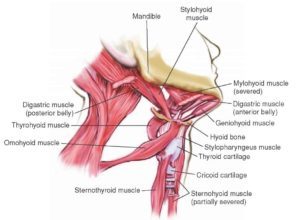[su_divider top=”no” style=”double” divider_color=”#952524″ link_color=”#952524″ size=”2″ margin=”10″]
What is Eagles Syndrome? How to manage it? What are the precautions to be taken? What are the signs and symptoms? What is the cause of this disease? How to treat it? How can homeopathy help you? All of this answered, in this post and of course our doctors always there to help you. Just fill in your details in the form down below and we will answer all your questions for FREE!
[su_divider top=”no” style=”double” divider_color=”#952524″ link_color=”#952524″ size=”2″ margin=”10″]
[sc name=”query”]

What is Eagles Syndrome?
Eagles syndrome is characterized by recurrent pain in the oropharynx and face due to an elongated styloid process or calcified stylohyoid ligament.
Location is medial, and in anterior portion toward the maxilla-vertebral-pharyngeal recess.
With the stylohyoid ligament and the small horn of the hyoid bone, the styloid process forms the stylohyoid apparatus, which arises embryonically from the Reichert cartilage of the second branchial arch.
The definition length of Styloid process of Eagle’s Syndrome is 2.5-3.0 cm.
Who is more prone to get affected with Eagles Syndrome?
It tends to occur in the age group between 30-50yrs of age and is more common in women.
What are the signs and symptoms of Eagles Syndrome?
• This syndrome was typically presented after pharyngeal trauma or tonsillectomy.
• A unilateral sore throat, dysphagia, tinnitus.
• It presents as nagging dull, chronic pain in the throat, sometimes radiating to the ipsilateral ear and continuous the sensation of a foreign body in the throat.
• Sometimes, it presents as odynophagia, dysphonia, hypersalivation, and headache.
• Bilateral sides involvement is very common.
• Pain is experienced while turning head or opening mouth.
• pain in the face, throat with a symptom of bloodshot eyes, sinusitis
• The person may also feel dizziness; there may be the pain on extending tongue…
What investigations are advised in cases of Eagles Syndrome?
• The blood test to rule out systemic diseases.
• CBC count is obtained if the infection is suspected.
• Lateral view radiographs
• CT scan
• MRI scan
What treatment is advised in Eagles Syndrome?
• Analgesics
• Anticonvulsants
• Antidepressant
• Use of steroids or long-acting local anesthetic agents
• Orthopantomogram (panoramic view)
Only severe cases, which do not respond to analgesics and anti-inflammatory
medications, require surgery.
What is the classification of Eagles Syndrome?
The classical stylohyoid syndrome: It occurs after tonsillectomy. It is presented with a dull ache in the lateral pharyngeal wall and ipsilateral ear.
Stylocarotid syndrome: it is associated with cervical pain, ocular and facial pain. The pain is caused due to irritation of the carotid artery.
Describe the Management of Eagles Syndrome?
• Analgesics
• Anticonvulsants
• Antidepressant
• Use of corticosteroids or long-acting local anesthetic agents
• Surgery is the preferred management modality.
What is the complication of Eagles Syndrome?
• Neck pain
• Facial pain
• Dysphonia
• Dysphagia
What is the prognosis of Eagles Syndrome?
The overall success rate of treatment is about 80% and recovery is fast after surgery.
What are the commonly indicated Homeopathic remedies for Eagles Syndrome?
The commonly indicated Homeopathic remedies are as follows: –
Calc phos
Nat ars
Mag phos
Calc Carb
Causticum
For more information, you can visit Wikipedia and eMedicine.
Eagles Syndrome
[su_divider divider_color=”#952524″ link_color=”#952524″ size=”2″ margin=”10″]
[sc name=”know-your-doctor”]
[sc name=”more-links-diseases”]

